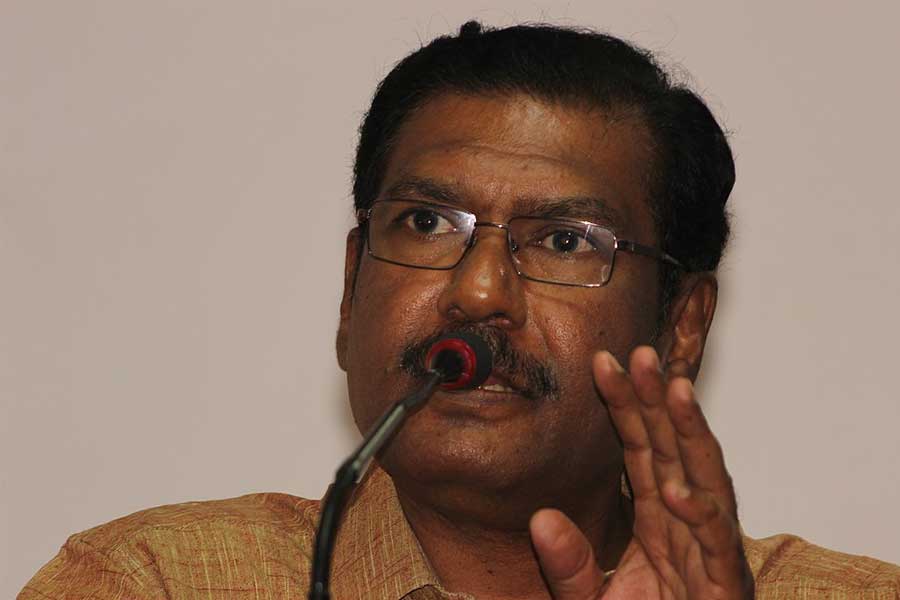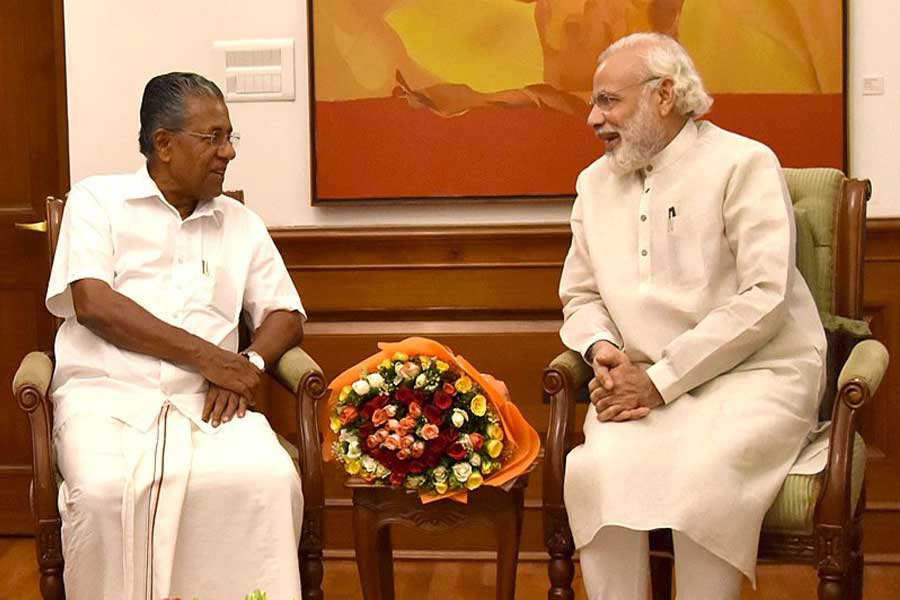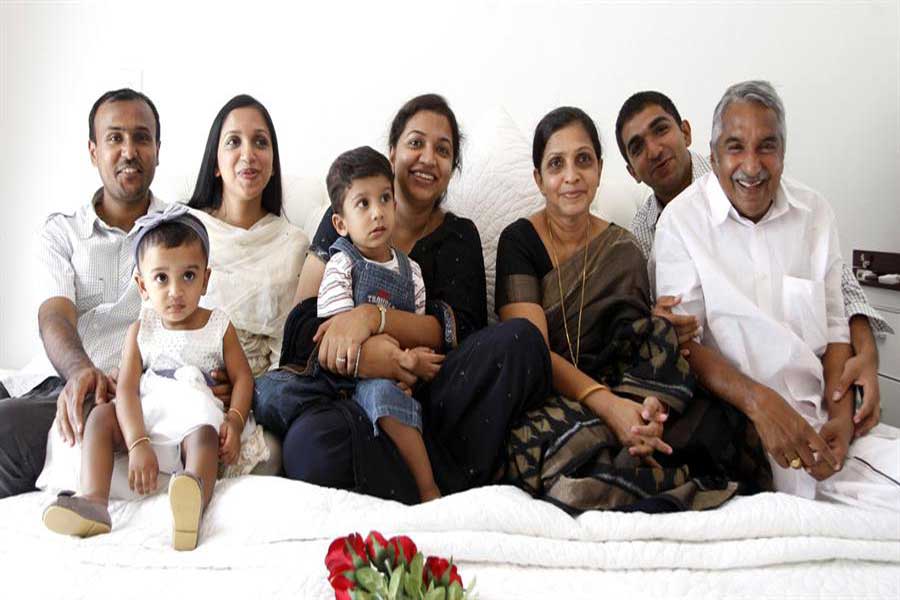The storm created by the media and the opposition on the appointment of ex-MP A Sampath as he first political representative of the Kerala Government—with Cabinet Rank to boot—to liaise with the BJP Government in New Delhi seems to have died down. Even though there were Left Front Governments led by the Communist Party of India (Marxist) in Kerala, West Bengal and Tripura in the past, this is the first time in the history of Left governments that a political leader is appointed at the national capital as a special envoy to liaise with the Centre on behalf of the State Government.
During the British colonial rule, the heads of the princely states used to visit the viceroy’s residence in Raisina Hill in New Delhi. The old Travancore House was one such building constructed by the Maharaja of Travancore for his stay whenever he visited the national capital to pay his obeisance to the viceroy. A part of the Kerala House at Jantar Mantar has been converted into an office for Sampath. He will work towards maintaining a cordial relationship between the BJP-led Union Government and the CPI (M)-led Kerala Government.

Sampath, a member of the CPI (M)’s State Committee and a trusted lieutenant of the Chief Minister, will be based in New Delhi for the remaining term of the Pinarayi Vijayan Government. He has been provided the services of a private secretary, two assistants, an office attendant, along with a driver and a state car. All this has been done with a specific political purpose. It has now dawned on the Chief Minister, who is halfway into his term, that such a representative of the State Government is indispensable in the current political situation to liaise with the Centre over and above the bureaucrats. It is also possible that the Centre too might have been in favour of such an arrangement.
Needless to say, such a political understanding is against the line of the CPI (M). It has been saying time and again, even in the recently-concluded Lok Sabha election campaign that the Modi government is a disaster for India. The CPI (M) central leadership which had projected the Modi Government as a junior partner in the US-Israel military joint exercises in their Election Manifesto will find it hard to explain the swing of the Left Government towards the Right.
In fact, Chief Minister Pinarayi Vijayan has been maintaining a surreptitious political understanding with the Modi Government right from the beginning. Within two months of his taking charge as the Chief Minister of Kerala, Pinarayi Vijayan—bypassing all protocols—had a secret parley with the RSS-BJP leaders of the State. The meeting took place at the Mascot Hotel in Thiruvananthapuram on July 30, 2016. The details of this meeting, which was kept as a secret, was ultimately revealed in a book ironically released by the Chief Minister himself.
The murder of two party cadres of CPI (M) by Rashtriya Swayamsevak Sangh cadres, and retaliatory murder of an RSS man by CPI (M) supporters in Pinarayi, in Kannur District, had led to state-wide protests. The book titled Kannur: Inside India’s Bloodiest Revenge Politics authored by journalist Ullekh N P, son of former CPI (M) Kannur District Secretary Pattiam Gopalan, revealed this insider information of the meeting arranged by a spiritual leader close to RSS Sarsanghchalak Mohan Bhagwat.
Apart from the Chief Minister, this meeting was also attended by CPI (M) State Secretary Kodiyeri Balakrishnan and P Gopalan Kutty Master, Kummanam Rajasekharan and O Rajagopal representing the RSS-BJP. This meeting was held to broker a truce between the two parties and to put an end to the street fights among the rank of the two parties which often led to murder and bloodshed. But this understanding between the leaders did not percolate down to the rank and file.
The dominance of local leaders from both parties, who came to prominence through the notorious clashes, saw to it that the violence between ideological opponents continued. As a result, the RSS ensured that the Kerala Chief Minister faced stiff protests and sloganeering whenever he visited another State. And the spate of political murders continued in Kerala.
In 2018, the Chief Minister had complained that the Modi Government maintained a step-motherly attitude towards the state of Kerala by not releasing enough funds for the flood-hit State. On top of it, the Centre also put a spoke in the wheel when foreign aid was offered to the State by countries from abroad.
Even though the Centre had frozen the Chief Minister’s dream project of National Highways expansion, he did not make it a political issue in the Lok Sabha elections. Later, during a private visit of Nitin Gadkari, the Minister for Road Transport and Highways, to Kerala, the Chief Minister invited him for lunch at Cliff House and succeeded in getting an assurance from Gadkari that the Central Government would provide all the assistance for the development of Kerala provided the State Government brought certain changes in its policies.
In continuation of the discussion with regard to the National Highways project, the Chief Minister and the representatives of the State Government had discussions with Nitin Gadkari in Delhi, and the State Government agreed to bear one fourth of the cost of the land acquisition by the National Highway Authority of India (NHAI) as a mark of its change in policy. And the appointment of Sampath is only to speed up the process of cooperation and extract the best from the Central Government.
The decision to involve the World Bank in the future development of Kerala is a result of this meeting Chief Minister had in Delhi. It is for the first time in the history of India that the World Bank has become a partner in the development of a State following the signing of an agreement with the Kerala Government. On July 15, the first installment of the World Bank loan amounting to Rupees 1725 Crore was released through the Government of India’s Department of Economic Affairs (DEA). As a matter of policy the World Bank cannot directly give aid to any State Government in any part of the world.
This amount of Rs.1725 Crore will be given as a loan to Kerala in two installments. The loan comes with an interest of Rs. 1057.5 Crore over a period of thirty years. The only solace to the State government is that the repayment of the loan will begin only after five years.
It is ironical that the same Left Parties fought tooth and nail when the Government of India under Indira Gandhi took a loan from the IMF (International Monetary Fund) in 1980, and when Manmohan Singh rode the globalization wave. The policies followed by Pinarayi Vijayan and his government is in total contrast to what the Communist Party’s yesteryear leaders EMS Namboothirippad, Jyoti Basu and Ashok Mitra advocated.
The CPI (M) had always been equating the Congress party with the BJP because according to them, Congress’ economic policies are “neo-liberal” in nature like the BJP’s, and in tune with that of America’s Capitalist policies. But today, Pinarayi Vijayan is leading his Left Democratic Front Government through the same path which his party has always been opposing.
When we see the London Stock Exchange, the World Bank and the other international economic forums receiving Pinarayi Vijayan with open arms and bouquets, one is reminded of the prescient words of EMS Namboothirippad:
“When those who are opposing Communism praise me, then you should understand that something is seriously wrong with me and my policies”.
Translated by Sangita Harry







